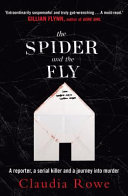A friend was reading something that I thought would be interested in-a real life story of an intrepid investigative reporter who decides to psychologically profile a small town serial killer, and he, in turn, tries to manipulate her. I should have recalled that she also stopped reading it. The Spider and the Fly: A Reporter, a Serial Killer, and the Meaning of Murder is the most repulsive autobiography disguised as a true crime non-fiction book. It could easily be called How Claudia Got Her Groove Off the Backs of Other People’s Tragedies. Her magical negro happened to be a serial killer, and after she is done comparing common traits and her experience with abusive behavior, she is able to move on and have a life and family.
What is most obviously off putting about The Spider and the Fly: A Reporter, a Serial Killer, and the Meaning of Murder is the constant shift in tone before it is apparent that it is more memoir than non-fiction true crime. At times, she takes the tone of a gumshoe dime store detective novel by stating what people who were part of the investigation were feeling. When she finally delves into memoir, she begrudgingly and vaguely gives parts of her story then retreads parts of the investigation that she already detailed. At least if you are going to be a narcissist, write well.
The author reminds me of people who think that they are not racist, but the most important characteristic about any person is the color of their skin. Don’t get me wrong. I’m not a fan of people pretending to be colorblind. I’m black, and if you don’t notice that, I think that you are missing valuable information and ignoring me. She is literally the kind of person who would randomly start discussing topics that she thinks black people would like. When I am the receiver in this context, I am puzzled as to why someone is discussing tap dancing with me when I have never owned a pair of tap shoes or expressed interest in tap until later when I have an epiphany, “Oh, it is because I’m black! She couldn’t think of anything else to talk to me about except black things.” She thinks that the killer would like blues or soul music, but is surprised that he loves Billy Joel. I’m sure that there is a great joke that I can make, but I’m not a comedian.
She calls Star Trek a movie, not a TV series with subsequent movies (the events in The Spider and the Fly: A Reporter, a Serial Killer, and the Meaning of Murder unfold in the 1990s, pre J.J. Abrams’ reboot_. She has Lena Dunham moments when she reveals things that she thinks is common to everyone, such as her secret high school admiration of the Nazis (she is Jewish), and I just thought, “Oh no, that is just you. No. No. No.” [Get Out reference]. Even the serial killer pleads, “Stop trying to identify with me (page 155).” When she and her partner adopt a dog, I guessed correctly that they were probably the worst people to adopt an animal albeit she at least didn’t kill the dog.
I’m sorry that she had a rough life, but her book is fundamentally dishonest. Sure she says that she is not writing the book as a journalist because she is including herself in the narrative, but she does not warn her readers until late in the book that we are going to be examining her childhood. Between the shifting narrative and the self-professed short shrift given to the victims, I think that Rowe was still not mature enough to write about this part of her life or to bring any enlightenment to Poughkeepsie tragedy. One thing is clear: even though the cops knew that the killer was a physically abusive rapist, he was still called a teddy bear by everyone and not really punished or considered a suspect until he confessed. Be afraid. Be very afraid.

The Spider and the Fly: A Reporter, a Serial Killer, and the Meaning of Murder
Stay In The Know
Join my mailing list to get updates about recent reviews, upcoming speaking engagements, and film news.




